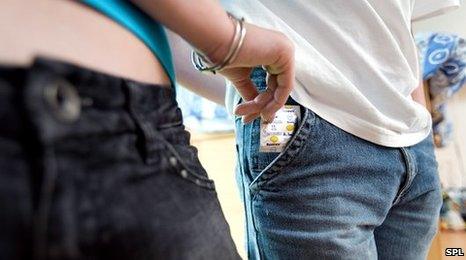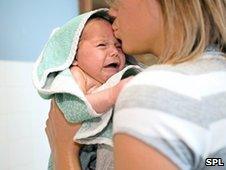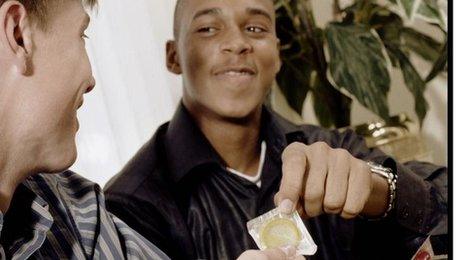Teenagers to be offered more contraception options
- Published

Different forms of contraception should be available to girls as young as 13. The British Medical Association (BMA) says GPs' need to stop recommending the pill as the main method for teenagers.
It's a change to previous advice. Long-term forms of contraception such as injections, implants and coils have generally been offered to older women who've already had children.
A BMA spokesman told Newsbeat: "We believe it is important females of all ages should be aware of the many types of contraception available."
Cheryl's 20 and went on the pill at 14 but she often forgot to take it and got pregnant for the first time at 15.
"I had my son at 15 then I went on the implant," she said. "It's basically where doctors put a contraceptive rod or needle in your skin. It lasts up to three years.
"I came off that because it messed up my cycle and then I got pregnant two days later.
"Now I just use condoms because it's the best contraceptive out there and it protects me against STIs."
'Really ill'
According to the Office for National Statistics, teenage pregnancy rates in the UK have fallen by 13% in the last two years but it is still has the highest levels in Europe.
Family & Youth Concern, an organisation which opposes children being given information about sex at a young age, doesn't agree with the new guidelines.
Its director Norman Wells said: "We are very concerned that girls as young as 13 will now be able to go on long-term contraceptives without their parents knowing.
"GPs should be discouraging girls as young as 13 from having sex, but instead they seem to show interest in injecting girls with contraceptives.
"More importantly coils, implants, injections and even the pill will not protect you from sexually transmitted infections (STIs)."
Amy told Newsbeat her GP advised her to go on the pill when she was 14 because she had really heavy periods.
After a while she started to feel really ill.
When Amy went back to her GP she found out she was four months pregnant.
'Safe'
She said she realised she needed to try something different after having her son.
"Doctors put me on the injection for two years and for me it's been good because I haven't got pregnant [again].

The UK has the highest rates of teenage pregnancies in Europe
"But I wouldn't recommend it to my 14-year-old sister. She's too young."
The NHS information centre says the pill is still the most common form of contraceptive used by girls, but the other forms are growing in popularity with under-18s.
Dr Jackie Abrahams is the lead doctor in Derby for contraception and sexual health.
She said: "Young people are scared of having implants and coils fitted because they hear of so many horror stories but in fact they are not as bad as they sound. They are safe.
"There is a slight risk of infection when they are being fitted and a one in thousand risk of perforation of the womb when fitting an IUD.
"If you do not want to get pregnant these methods are more reliable than the pill."
- Published23 March 2010
